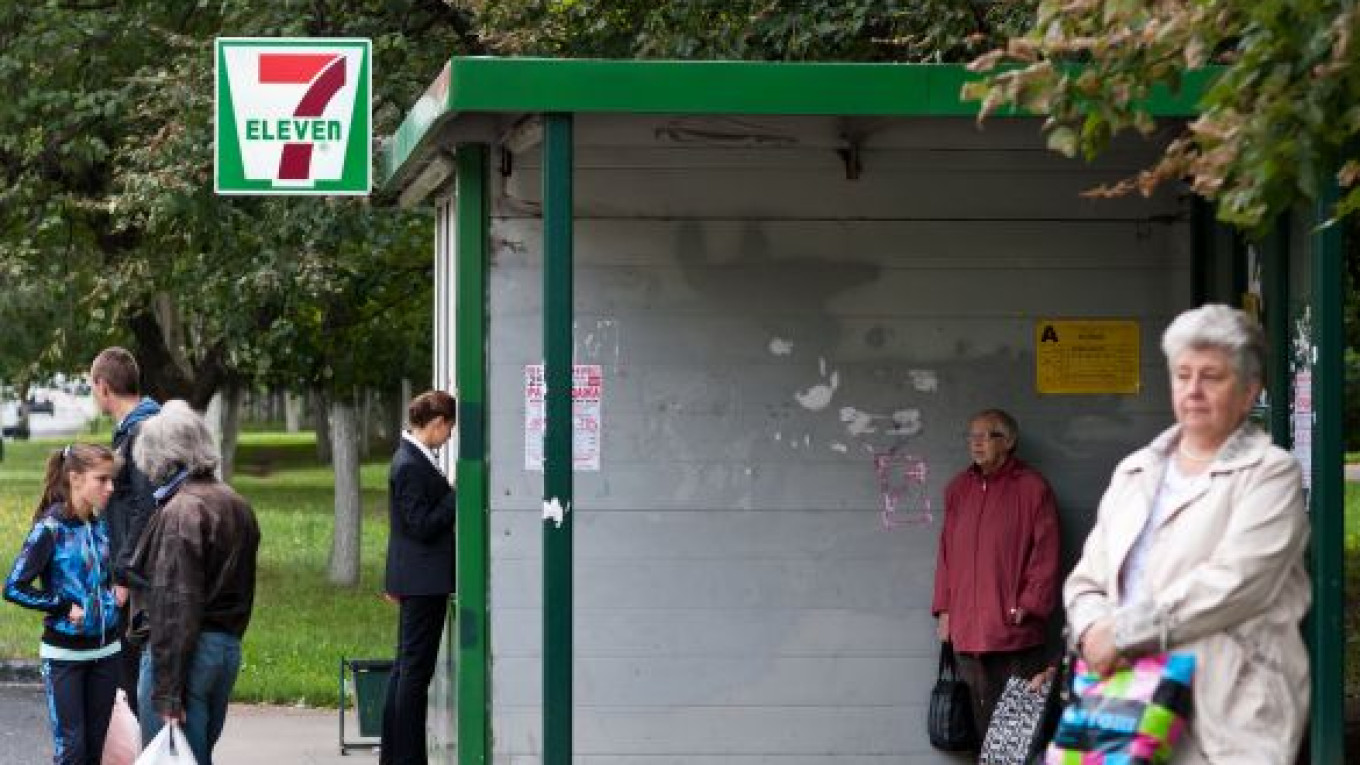Correction appended
DOLGOPRUDNY, Moscow Region — A bus-stop kiosk selling beer and cigarettes could easily get lost among many similar shops scattered on the streets of this town 18 kilometers north of Moscow if it were not for one special feature.
The distinctive square logo of 7-Eleven, the U.S. chain of convenience stores, is emblazoned on the sign and wall of the green-and-gray kiosk on Dolgoprudny's freshly repaved Dirizhabelnaya Ulitsa. But even though the sign carries the ® symbol indicating that 7-Eleven is a registered trademark, don't expect to find any Slurpees for sale.
This 7-Eleven has no relation to the U.S. chain.
The kiosk is a striking example of the problem that Russia still faces in protecting intellectual property rights even as it becomes the 156th member of the World Trade Organization on Wednesday. Intellectual property infringements ranging from pirated movies to counterfeit sneakers have long posed a serious barrier in the country's 18-year marathon for accession.
A salesman found Tuesday afternoon relaxing on a couch inside the spacious 7-Eleven kiosk said he didn't know who had put the logo on top of the shop or why. But he said he found the name "amusing."
Reached by telephone, Gamlet Avetisyan, who operates the kiosk under lease, explained that the idea for the name belonged to the shop's owner, who had placed the logo outside after seeing 7-Eleven stores during a vacation in Thailand. 7-Eleven has 6,660 outlets in Thailand, according to the Dallas-based company's website.
Avetisyan, an Armenian native who has lived in Russia for 20 years, said his kiosk had already sported the 7-Eleven sign when he rented it two years ago. He added that he also operated a second 7-Eleven kiosk down the street, leased from the same owner.
The kiosk owner couldn't be reached for comment Tuesday.
Avetisyan said he was aware that 7-Eleven was an internationally known store because shoppers at his kiosks had told him about seeing the logo in other countries.
7-Eleven has more than 39,300 convenience stores around the world, with franchisees in Australia, China, Denmark, Hong Kong, Japan, Norway, Sweden, Taiwan and other countries, according to the company's website. Russia is not listed among the countries.
Repeated phone calls and e-mails to 7-Eleven's corporate headquarters for comment on the Russian kiosks went unanswered over the past week.
But many international companies frequently see their intellectual property rights violated in Russia, said Irina Tulubyeva, managing partner at law firm Tulubyeva, Osipov & Partners. Adidas, for one, has spent years fighting entrepreneurs who use its logo illegally, she said. Other violators take a creative approach to avoid prosecution, with some outdoor markets offering items like the Ultrafiolet fragrance, a cheap imitation of the Ultraviolet brand by Paco Rabanne.
Russia's membership in the WTO means that the country, which was the largest economy outside the trade bloc, has brought its trade rules in compliance with international standards and thus become —? at least in theory —? a more predictable environment for international companies.
Even though strides have been taken to protect intellectual property rights in recent years, problems remain with enforcement, lawyers said.
The act of becoming a WTO member isn't likely to eliminate the violations, because many Russians don't consider trademarks or copyrights as property and think that, unlike a purse, they can't be stolen, Tulubyeva said.
Avetisyan, the operator of the 7-Eleven kiosks in Dolgoprudny, expressed surprise when asked whether the U.S. company had granted permission to use the trademarked logo.
"Does it violate a law?" he said.
In fact, the use of a logo does not violate Russian law as long as the U.S. owner hasn't registered it here, said Sergei Gorbylyov, a lawyer with Yukov, Khrenov & Partners.
In order to claim the right to use its brandname, an international company should register it with the Federal Service for Intellectual Property or ask the service to acknowledge its brand as a world-renowned trademark, he said.
But if a company like 7-Eleven goes ahead with registration, it might find that an unscrupulous party has already registered the trademark, and in that case it will need to mount a legal challenge, Gorbylyov said.
Meanwhile, fans of the real 7-Eleven who want their Slurpee fix can find the fruit-flavored, crushed-ice drink on sale at Moscow eateries operated by another U.S. chain, Dunkin' Donuts. Unlike 7-Eleven,? these Dunkin' Donuts outlets are the real thing.
Correction: An earlier version of this story incorrectly identified Russia as the 155th member of the World Trade Organization. In fact, Russia is the 156th member of the global trade rules body.
Related articles:
A Message from The Moscow Times:
Dear readers,
We are facing unprecedented challenges. Russia's Prosecutor General's Office has designated The Moscow Times as an "undesirable" organization, criminalizing our work and putting our staff at risk of prosecution. This follows our earlier unjust labeling as a "foreign agent."
These actions are direct attempts to silence independent journalism in Russia. The authorities claim our work "discredits the decisions of the Russian leadership." We see things differently: we strive to provide accurate, unbiased reporting on Russia.
We, the journalists of The Moscow Times, refuse to be silenced. But to continue our work, we need your help.
Your support, no matter how small, makes a world of difference. If you can, please support us monthly starting from just $2. It's quick to set up, and every contribution makes a significant impact.
By supporting The Moscow Times, you're defending open, independent journalism in the face of repression. Thank you for standing with us.
Remind me later.


